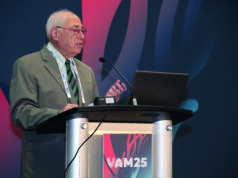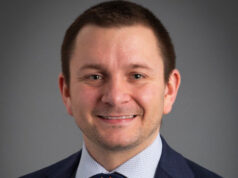As I view the implementation of the Patient Protection and Accountable Care Act (ACA), I am concerned that this bureaucratic, administrative, directive-driven apparatus will have a disproportionately negative impact on the largest constituency in the Society for Vascular Surgery, the private practice vascular surgeon (the private practice model), as opposed to the employed physician model. The impact may be severe enough that, except for large groups, its existence will be imperiled. Ironically, if this should occur, then even the status of the employed physician will be negatively affected and, ultimately, so will the care of the patients in need of our services. It is for this reason that I believe the time has come for the SVS to broaden its focus by declaring as one of its core values the support of the private practice model of vascular surgery and to back these words up with action by creating several seats on the Board of Directors for private practitioners. Only by doing this will the SVS better understand and address the burdens the ACA is creating for them.
As described in a recent lecture by John Marini, Ph.D., Visiting Distinguished Fellow at the Allan P. Kirby Jr. Center for Constitutional Studies and Citizenship in Washington, the ACA “is little more than 2,500 pages long and all it did was provide the administrative apparatus with the right and power to formulate rules and regulations governing healthcare.”
An example is the Independent Physicians Advisory Panel (IPAP), a bureaucratic board with no accountability, not even to Congress, yet it is empowered to determine Medicare expenditures. Furthermore, the writings of some of the chief architects of the ACA express their preference for a vertically integrated system practice model with governmental incentives (i.e., penalties) to make physicians comply.
This is not a ringing endorsement for the private practice model. This should make us all take pause because the lack of accountability and our lack of recourse create an uneven playing field.
As we have seen in the roll out of the ACA, it is a law in name only as exceptions have been granted at will by fiat for groups such as Congress, large corporations, unions, and the like, leaving no doubt that it can be manipulated to suit a bureaucrat’s purpose. How we protect ourselves and our patients needs to be our main concern.
Some of the burdens created by the ACA for the private practitioner involve the increased compliance costs associated with the directives for data collection and reporting, EHRs, meaningful use, and the like – such as hiring additional staff – while the ACA simultaneously attempts to bend the cost curve downward, decreasing reimbursement.
The ACA provides no financial support to offset the resulting increased costs. Imagine telling a builder you wanted special “extras” built into a house at no additional costs to you. Preposterous! The ultimate pressure of course is meeting payroll, overhead costs, and capital expenditures under these restraints.
The jobs of many employees are at risk here. I am concerned that unless a society openly supports and advocates for the private practice model and has private practice vascular surgeons on its board, many of these concerns will not be addressed.
If the ACA succeeds in eliminating private practice, what would be lost? Plenty! From innovative ways to increase patient access, value, and cost-effective and highly efficient treatment centers, much will be lost.
In fact, at a time when the New York Times writes about whether today’s surgeons are adequately prepared, private practice offers a great opportunity to vascular fellowship programs for partnership to provide additional surgical exposure and real- world business experience, something inexplicably absent in most fellowship programs.
The private practice of vascular surgery has always been geared to providing unsurpassed access, service, innovation, and cost-effective therapy with minimal administrative overlay and costs because it is the only way this practice model can survive.
There is no benefactor or other source of funds to keep it afloat. Ironically, if private practice were to disappear, the impact would also be felt by the employed physician because this would only increase the power of the administrative class at every institution, not a pleasant thought.
Given the bureaucrats’ expanding administrative state into the realm of medicine, as exemplified by the ACA, and given the fact that it creates burdens on the private practitioner not experienced on a daily basis by the employed physician, it is imperative that professional societies advocate for the private practice model and have representatives of both practice models on their boards.
Only in this manner can a professional society be fully informed and responsive to the impact of the ACA on both practice models, and only in this way will a professional society be truly representative of its constituents.
For the SVS, this means openly advocating for the private practice model and creating several board seats for members of its largest constituency, the private practice vascular surgeon. These representatives can be chosen at the annual meeting by those in private practice. This will serve to strengthen the SVS as it will be a more representative body of all its constituent parts and be better informed and able to respond to future issues which impact its membership.
Carlo A. Dall’Olmo, M.D., is a vascular surgeon and president, the Michigan Vascular Center, Flint.












